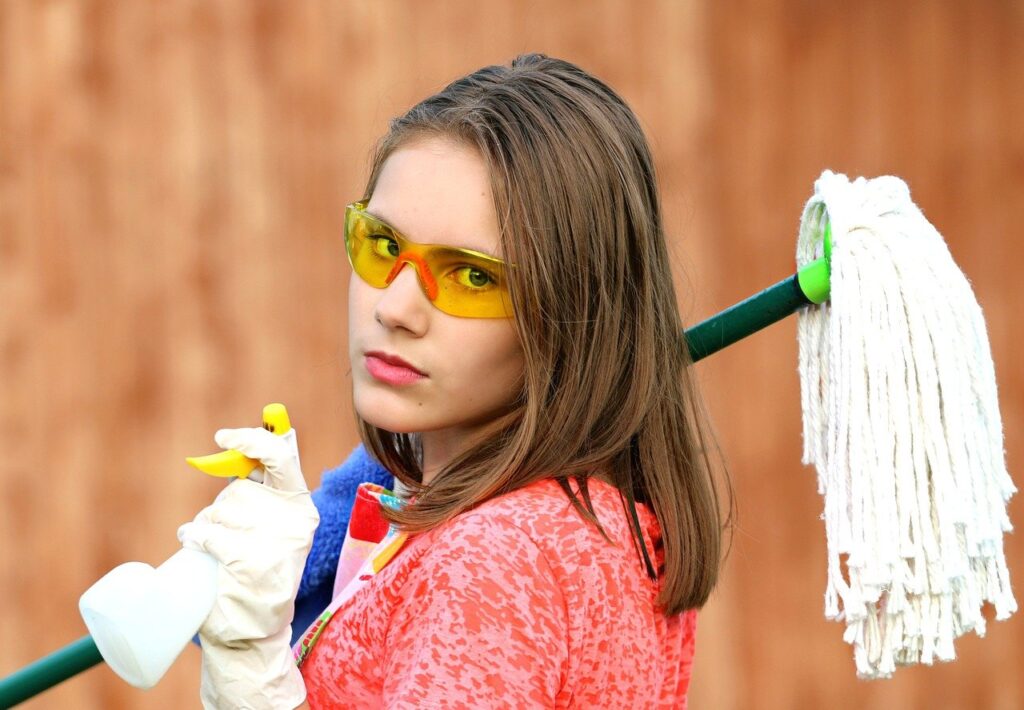28% of people in Wales are cleaning more often this year as opposed to last

A new survey conducted by Currys PC World reveals that Welsh households have polished up their cleaning routines – possibly as a result of increased hygiene awareness due to the COVID-19 pandemic – with 28% of people in Wales saying they clean more often this year as opposed to last, and 31% saying they clean ‘more thoroughly’ now.
This extra cleanliness does not come free, with people from Wales now spending an average of £12.70 a month on cleaning products and some spending over £20 a month.
However, the UK-wide study found that buyers could save money by switching to own-label or cheaper brands, with over half of Brits saying they only buy branded cleaning products, with 30% of them believing the higher price point equates to quality and effectiveness
Homecare expert, Lynsey Crombie aka the ‘Queen of Clean’ is all for using more affordable products, however, saying “I actually find some of the more expensive ones to be awful. A basic disinfectant and washing up liquid will always work well and not cost you much at all.”
Looking at different demographics, 16-24-year olds spend the most on their cleaning routines compared with other age-groups, averaging £14.73 a month. People in London (£14.54) and Northern Ireland (£14.02) are also the most likely to fork out more cash for a clean home, whereas those in the South West spend the least (£11.71).
Our cleaning habits and routines cost us time – whether you believe this is time well spent or not. For the average Brit, 6.5 hours a week are dedicated to keeping the home tidy – a figure which has risen by an additional 23 minutes since the dawn of COVID-19. Out of all of the age groups, 45-54- year olds are the most likely to have upped the time they spend cleaning since the pandemic.
This said, with the lockdown resulting in us spending more time at home, people have confessed to wearing things such as gym wear, socks and underwear more times before washing them now than pre-COVID. Men are most guilty of this, with 1 in 10 wearing their underwear three times before washing.
Lynsey Crombie aka the ‘Queen of Clean’ says that generally speaking “If you have been out for dinner for just a few hours, you probably do not need to come home and put that outfit in the wash. But, in the current climate I would advise you wash your clothes after every wear, if worn outside of your home.”
Quirky cleaning hacks also commonly feature in our hygiene routines. In fact, almost a quarter of Brits have tried to remove a red wine stain with white wine, with men most likely to have tried the hack.
Lynsey Crombie does not recommend this trick, however, saying “it simply does not work, it just makes it worse. To remove red wine, you need some warm soapy water (not hot) with a splash of white vinegar to scrub onto the stain and leave for 15 mins, before blotting dry.”
Some cleaning hacks that Lyndsey does endorse are:
- Use coca cola to remove limescale from the toilet – pour into an empty toilet bowl and leave overnight
- Remove rust using tomato ketchup – using a wet cloth dab the ketchup onto the rust and let it sit a while, before washing off
- Apply shaving foam to carpet for effective stain removal, especially make up!
Of all age-groups, the younger generations are more likely to proactively consider the environment when cleaning. For example, 25-34-year olds are the most likely to buy eco-friendly cleaning products and 16-24- year olds are the most likely to make their own eco-friendly cleaning products.
However, their care for the environment does not extend to re-using appliances – researchers noted that 1 in 5 16-24-year olds admitted they would prefer to throw away a dirty toaster, kettle or blender than clean it!
The chemicals found in commonly used cleaning products , along with the energy used by home appliances means that cleaning can have a negative impact on the environment – so increasing the frequency may not be good, while many Brits are making a conscious effort to be more eco-friendly, 2 in 5 admit the environment does not affect their cleaning habits at all.
However – one method is both chemical free and effective. Cleaning expert, Lynsey Crombie says “steam cleaning is a great eco-friendly method for cleaning floors, whilst also being safe for pets and young children.”
So, is the extra cleaning delivering peace of mind during troubling times?
According to Health psychologist, Benjamin Ainsworth, cleaning can have therapeutic benefits and result in a more serene environment that promotes feelings of calm and motivation. However, Benjamin says, obsessional cleaning can also mask deeper issues:
“While some people really benefit from and enjoy a ‘spring clean’, others might use cleaning as a ‘coping mechanism’ that can actually lead to increased anxiety and stress.”
While the COVID-19 pandemic has had an understandable impact on people’s attitudes towards hygiene, Ainsworth advises to “Try to avoid ‘excessive cleaning’, which can be psychologically unhealthy. While an extra wipe with some soap and water usually does no harm, it’s important to make sure that cleaning habits are in line with your own personal level of risk.”





